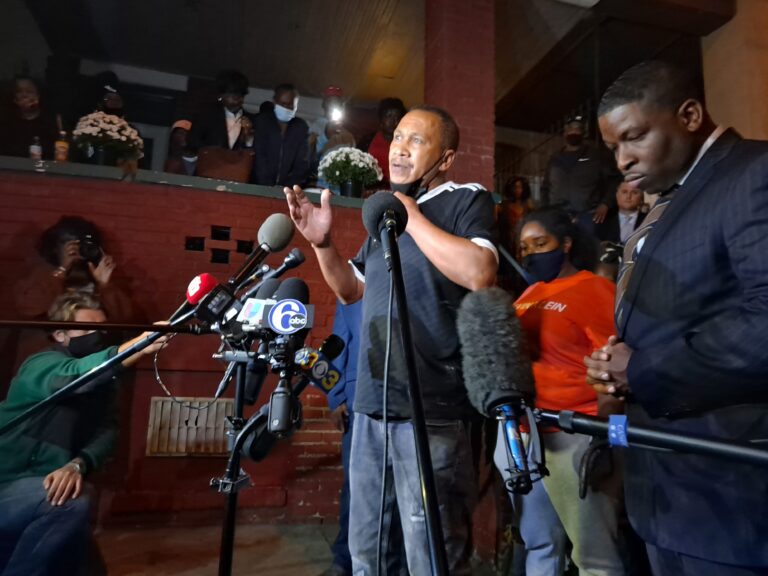911 program could have helped spare Walter Wallace’s life
Philly police recently announced a new 911 system to handle mental health cases. Its non-implementation may have cost Walter Wallace Jr. his life.
Listen 17:31
Walter Wallace Sr. said his son was suffering from a mental health crisis when he was shot and killed by police. (Ximena Conde/WHYY)
Walter Wallace Jr.’s family says they called for an ambulance on Monday afternoon because the 27-year-old was in the midst of a mental health crisis. Police arrived instead, and Wallace was shot and killed by two officers.
Only three weeks earlier, the department announced a new program calling for a clinically trained behavioral health worker to help identify 911 calls that require a different kind of response.
WHYY reporters Ximena Conde and Nina Feldman dig into why that initiative wasn’t implemented in time, potentially costing Wallace his life.

Hear the whole story on The Why
Interview highlights
On the events that led up to Wallace’s killing by police
XIMENA: Things escalated pretty quickly. Two of the officers arrived and found Wallace holding a knife. His wife told them that he was manic and bipolar. The officers were standing at the foot of these steps and according to eyewitnesses and video captured the moments before Wallace’s shooting, police almost immediately drew their weapons. Wallace’s mom, who was outside, says she told police that Wallace was her son and tried to prevent Wallace from going near the police. Neighbors also stepped in. They were screaming that they knew him, also asking police not to shoot. In the video, Wallace appears to be several feet away from the officers while they have their guns drawn and he’s clutching this knife. And you can see that he’s advancing forward and then the camera kind of pans away. And that’s when police opened fire.
On the 911 program that was supposed to help in these situations
NINA: The Philadelphia Police Department knows that this is a weak spot for them, flagging and identifying mental health calls and and responding to them appropriately. So in the beginning of October, the department announced a new program in partnership with the city’s Department of Behavioral Health and Intellectual Disability Services. And the way it would work is that a behavioral health expert was going to be embedded into the 911 radio room with the call dispatchers. And her job at first was just going to be to listen in on calls, screen them, help develop a system for understanding kind of what type of thing to listen for or ask about in determining if a call had a mental health crisis attached to it. And so her first task was just to develop that coding system so that the correct and appropriately trained officers would be deployed.
The goal of the program was to scale up so that a behavioral health expert would actually be deployed alongside officers to the scene when those specific types of calls were identified. And when I talked to [PPD special advisor] Frances Healey about this, when the program is rolling out, he said, we want this to be in place we want everybody to know about it. So that trust can really be built or strengthened or rebuilt with the community that they know when they call 911 that the appropriate response is coming …
[Police] Commissioner Outlaw said the program was still in its infancy and that person was, you know, there to help develop the program. But she didn’t happen to be there at the time when the [911] call [about Walter Wallace Jr.] came in.
On how the incident has further undermined public trust
XIMENA: From the community point of view, this is just an another example of the police department promising change, making statements, saying that they’re going to work hard to build trust with the community, creating some sort of initiative and then that initiative falling short, and having a repeat of a Black resident being killed for what they see as an unjustified reason.
WHYY is your source for fact-based, in-depth journalism and information. As a nonprofit organization, we rely on financial support from readers like you. Please give today.






